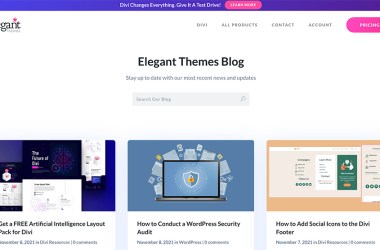Updated: Jan 02, 2024 By: Dessign Team
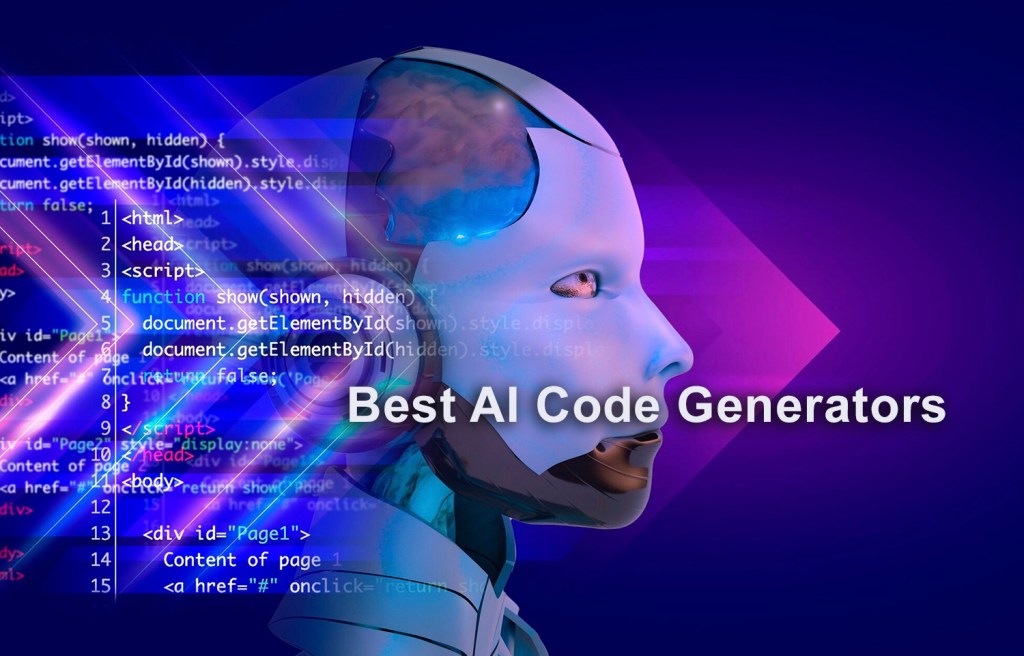
In recent years, artificial intelligence (AI) has permeated the software development industry, offering innovative solutions that optimize workflows and increase efficiency.
AI code generators are a prime example of this technological advancement, empowering developers with powerful tools for automatically generating lines of code in various languages.
Leveraging AI's ability to learn and predict, these tools provide invaluable assistance, allowing developers to focus on higher-level tasks and reducing the time needed to complete projects.
The utility of these code generators extends beyond coding assistance, offering integration with popular development environments, database management support, and even WordPress code generation.
Top 5+ AI Code Generators for Developers
Artificial Intelligence (AI) has made remarkable progress in various areas of software development, and code generation is no exception.
AI code generators assist developers in enhancing their productivity by providing suggestions, auto-completion, and real-time code completion.
This section will discuss some of the notable AI code generators that developers can utilize in their work.
1. GitHub Copilot
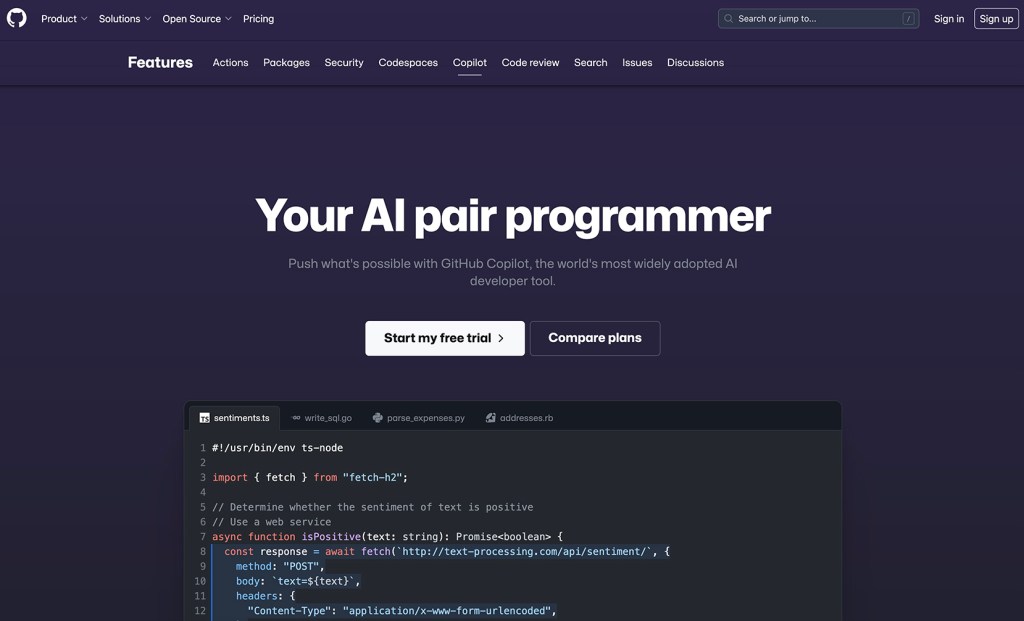
GitHub Copilot is a widely celebrated AI code generator. Powered by OpenAI Codex, it provides developers with context-aware code suggestions and auto-completion for a wide range of programming languages and frameworks. GitHub Copilot integrates seamlessly into Visual Studio Code, allowing developers to get assistance directly within their favorite coding environment.
Copilot integrates seamlessly into major code editors like VS Code, Atom, and IntelliJ. As you code, it suggests entire lines and blocks of code relevant to what you are working on. The suggestions save a huge amount of time compared to writing everything from scratch.
Copilot can suggest code in over a dozen languages including Python, JavaScript, TypeScript, Ruby, and Go. The code quality is excellent, matching what an experienced developer would write.
Overall, Copilot boosts developer productivity tremendously. It's the best autocomplete tool available and is like having an AI developer pair programming with you.
Key Features:
- Code completion powered by OpenAI Codex
- Suggests entire lines or functions based on context
- Integrates into Visual Studio Code and other IDEs
- Trained on public code from GitHub
2. TabNine
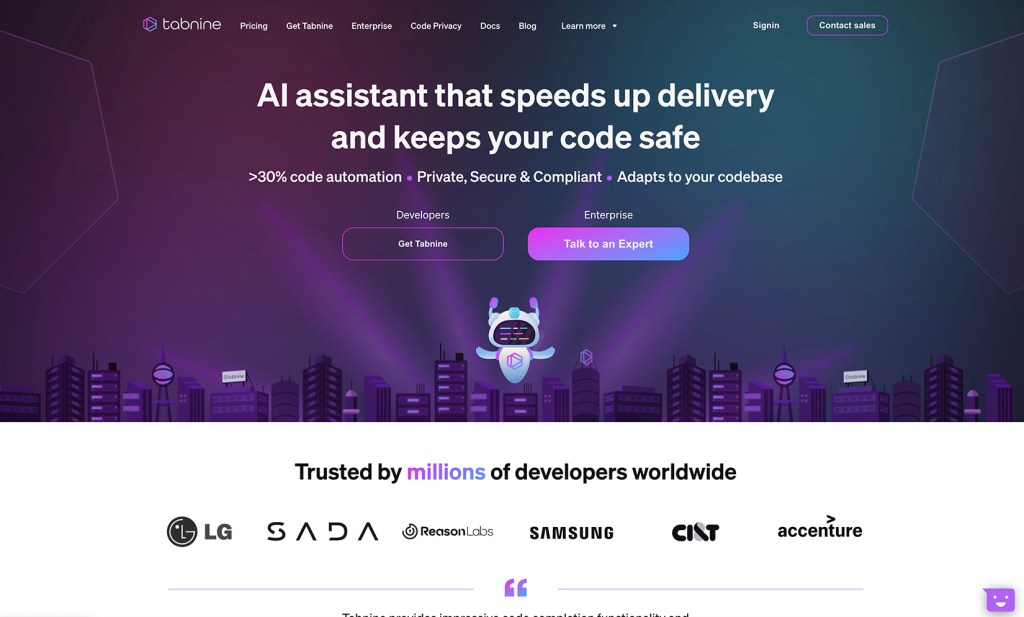
TabNine is another popular AI code completion tool. It employs deep learning algorithms for intelligent code completion in languages such as Java, Python, and C++. TabNine supports multiple code editors, making it a versatile choice for developers using different development environments.
The completions provided by Tabnine speed up development by reducing the amount of code you need to type out manually. You get intelligent autocomplete suggestions as you code in your editor.
Tabnine can suggest variables, method names, and even entire lines and blocks of code. The suggestions are context-aware and account for best practices. Tabnine claims developers report 3x faster coding when using the tool.
For intelligent autocomplete to boost productivity, Tabnine is a top choice. It integrates with all popular code editors and IDEs.
Key Features:
- Code completion tool that suggests variable, method, and function names
- Uses neural networks trained on code
- Integrates into most IDEs and code editors
- Fast autocomplete suggestions as you type
3. Replit Ghostwriter
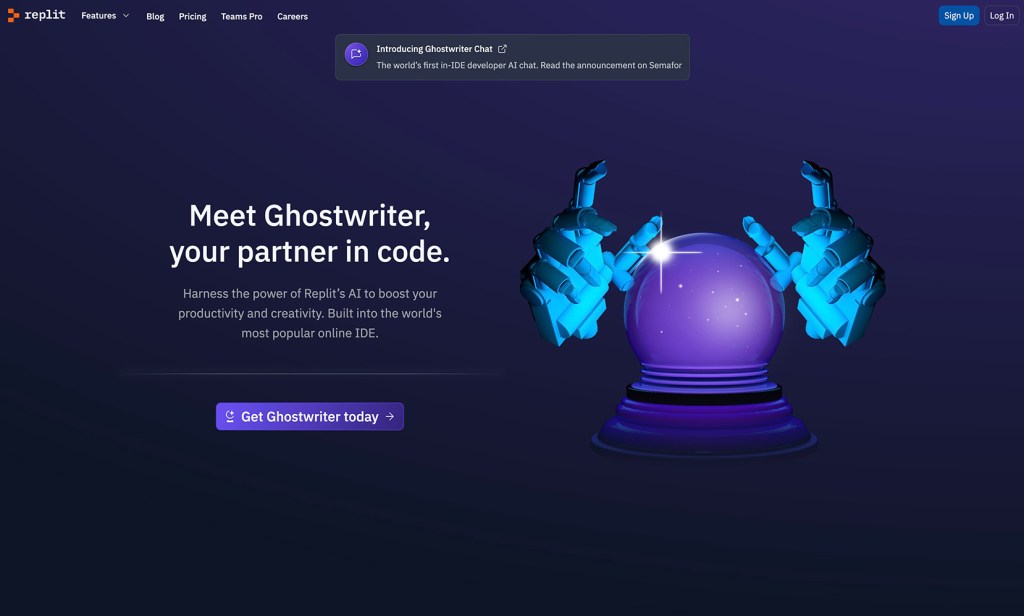
Replit Ghostwriter is an AI-assisted code generator integrated into the Replit online IDE. It helps developers write code faster by providing suggestions based on natural language queries and incorporates the expertise of OpenAI Codex to generate accurate code snippets.
Several other AI code generators focus on specific domains or tasks. For instance, MutableAI specializes in generating mutable tests for applications, while AI2SQL helps developers automatically convert natural language input into SQL queries.
Key Features:
- Code generation tool created by Anthropic
- Can generate whole functions or files based on natural language prompts
- Focused on Python code generation
- Currently in closed beta
4. CodeT5
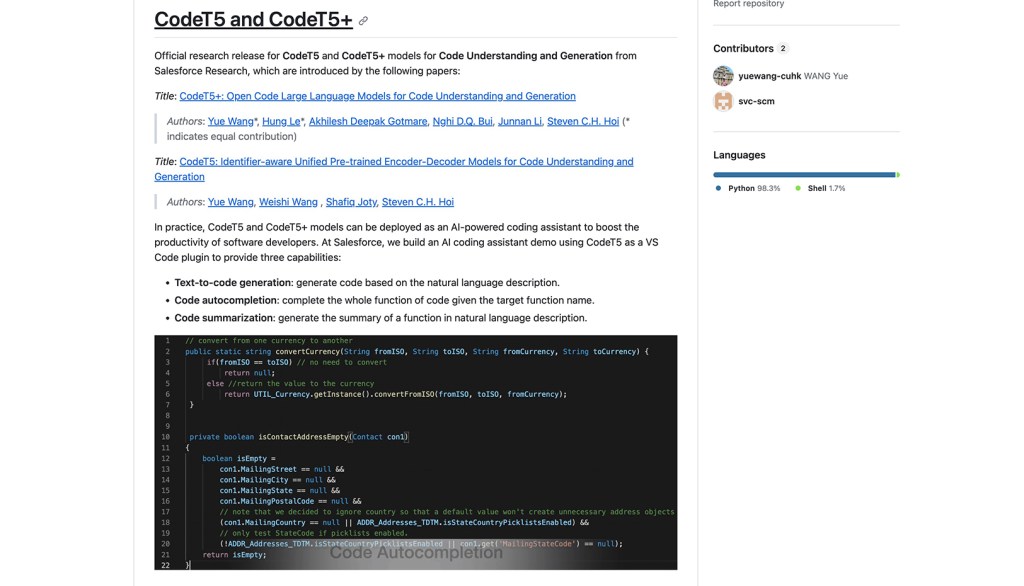
CodeT5 is an AI code generator based on the Transformer architecture. It excels in providing code translation, code summarization, and code completion for various programming languages, making it a valuable addition to any developer's toolkit.
Key Features:
- Code generation model from Google Research
- Transformer-based architecture trained on public code
- Can generate code snippets in multiple languages like Python, JavaScript, Go
- Open source model available to build on
5. AlphaCode
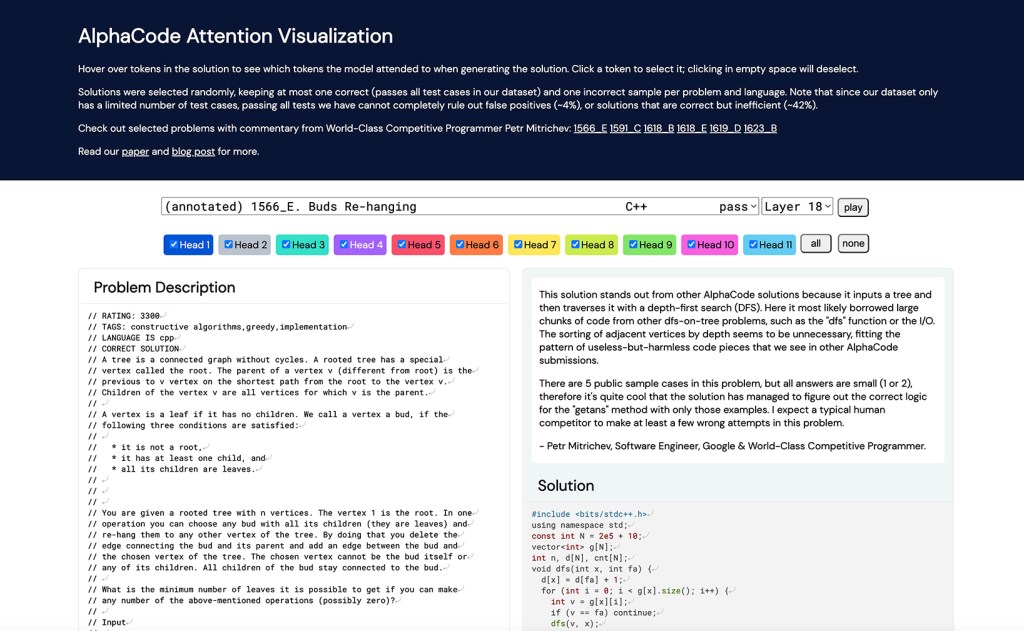
AlphaCode is an AI-based code generator designed for synthetic data generation and machine learning models. It enables developers in efficiently creating and assessing the performance of their models, particularly useful for data scientists and machine learning engineers.
These AI code generators assist developers in different aspects of the code development process, such as providing code suggestions, auto-completion, and real-time code completion. By using these innovative tools, developers can streamline their work and enhance their productivity.
Key Features:
- Code generation model from DeepMind
- Achieved state-of-the-art results on competitive programming challenges
- Focuses on competitive programming tasks in languages like Python and C++
- Not publicly available
6. Mutable.ai
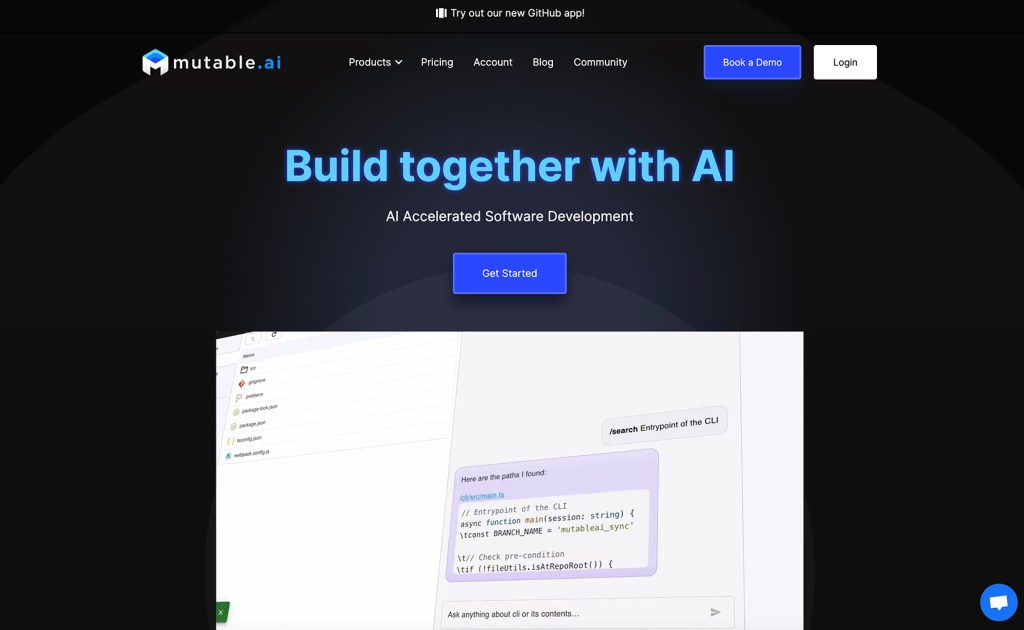
Mutable.ai is a cutting-edge technology company at the forefront of innovation in the field of artificial intelligence. Founded by a team of visionary engineers and researchers, Mutable.ai is dedicated to pushing the boundaries of what AI can achieve.
Their mission is to make AI more adaptable, flexible, and dynamic by developing advanced techniques for model training, deployment, and optimization. With a focus on creating tools and solutions that empower businesses and developers to harness the full potential of AI, Mutable.ai is poised to revolutionize industries ranging from healthcare and finance to robotics and natural language processing.
Their commitment to staying at the forefront of AI research and development positions Mutable.ai as a key player in shaping the future of intelligent technology.
Key Features:
- Commercial code generation platform
- Capabilities like autocomplete, explanation, code search
- Focused on Python, SQL, English to code generation
- Built on open source models like Codex and PaLM
Fundamentals of AI-Code Generators
AI-Code Generators leverage the power of artificial intelligence to enhance the programming experience by predicting and suggesting code snippets, streamlining the development process, and minimizing human errors. These tools employ advanced deep learning and machine learning algorithms to improve coding efficiency across a wide range of languages.
One of the key advantages of AI-Code Generators is their language versatility. Most of these tools are compatible with multiple programming languages, including popular ones such as Python, JavaScript, TypeScript, C++, Swift, and JS. This feature enables developers to switch between languages with ease while still enjoying the benefits of AI-powered code recommendations.
A prominent example of a generative AI for code is OpenAI Codex, which is based on GPT-3, one of the most advanced language models available. By leveraging the capabilities of GPT-3, OpenAI Codex provides code suggestions, documentation lookups, and error corrections with remarkable precision. This development has considerably impacted the programming landscape by offering developers access to a powerful AI-driven coding assistant.
Despite their numerous benefits, it is crucial for developers to understand the limitations of AI-code generators. These tools should not be seen as a substitute for in-depth knowledge of the core programming principles and languages. Instead, AI-code generators should be considered auxiliary support that can help developers in their day-to-day tasks, boosting productivity and code quality.
In essence, AI-Code Generators are revolutionizing the programming world by integrating cutting-edge artificial intelligence technologies to streamline the development process and elevate the overall coding experience. As these tools continue to evolve, they will likely play an increasingly significant role in software development, shaping the future of programming and code generation.
AI Code Generators and Integrated Development Environments
AI code generators have revolutionized the software development industry by streamlining the coding process and enabling developers to work more efficiently. These advanced tools can be integrated with various Integrated Development Environments (IDEs) to further enhance their utility and simplify software development tasks.
One popular IDE is Visual Studio Code, which supports a wide range of programming languages and has various extensions that can be used with AI code generators. For instance, the collaboration between OpenAI Codex and GitHub gave birth to GitHub Copilot, a powerful AI code generator that can be utilized as a Visual Studio Code extension. It assists developers by generating contextually relevant code snippets, saving time, and increasing productivity.
Another versatile IDE that can benefit from AI code generators is JetBrains IDEs, which include IntelliJ IDEA, PhpStorm, and PyCharm, among others. By incorporating AI-driven code generation into these development environments, programmers can quickly generate complex code structures, refactor existing code, and receive context-aware suggestions.
Jupyter Notebooks, recognized for their interactive functionality and support for data analysis and visualization tools, can also be combined with AI code generators. These notebooks enable data scientists and researchers to work with Python and other languages efficiently. Integrating AI code generation tools can help these professionals automate repetitive coding tasks, develop algorithms faster, and analyze complex data more effectively.
AI-Powered Code Assistance Tools
AI-powered code assistance tools have become increasingly popular among developers as they bring notable improvements in productivity and workflow. These tools leverage artificial intelligence to provide suggestions, detect bugs, and streamline coding tasks, enabling developers to write code more efficiently and accurately.
One prominent example of an AI coding assistant is GitHub Copilot, developed by GitHub in collaboration with OpenAI. GitHub Copilot provides real-time code suggestions, catering to various programming languages and frameworks, making it a powerful assistance tool in mainstream development environments like VS Code and Neovim.
Cody by Sourcegraph is another AI-powered code assistant that offers a comprehensive solution for code navigation, debugging, and bug detection. Its intelligent search function allows developers to quickly navigate through code repositories, streamlining the development process and improving the overall software quality.
CodeWP is an AI coding assistant that primarily targets WordPress developers. It assists with code snippets, custom functions, and theme building, significantly improving productivity. Its intuitive interface makes it easy for both experienced developers and beginners to take advantage of its features.
Codiga is a versatile AI-powered code assistant that focuses on enhancing the code review process. It integrates with popular code editors and provides immediate feedback on code quality and potential issues. By automating code analysis, Codiga helps developers ensure that their code adheres to best practices and is free from bugs and vulnerabilities.
AI code assistance tools, like the ones mentioned above, boost productivity by streamlining various aspects of the development process, such as debugging, code reviews, and bug detection. These smart solutions are reshaping the software development landscape, enabling developers to work more efficiently and confidently while maintaining code quality and best practices.
Applications of AI in Software Development
Artificial Intelligence (AI) has made a significant impact on various industries, and software development is no exception. AI-powered code generation tools have been transforming the programming landscape, offering new capabilities to developers and enhancing the development process overall.
One of the primary applications of AI in software development is code completion. AI-powered code generation tools, such as OpenAI Codex and GitHub Copilot, can predict and suggest code snippets based on the context of the code being written. This enables developers to write code more efficiently, reducing the time and effort required to complete a project.
Another benefit of AI in software development is the ability to automate routine tasks. AI code generators can quickly write boilerplate code, setup project templates, or even generate fully functional source code given a set of input parameters. This automation not only saves developers time but also helps maintain consistency across projects.
AI can also assist in the development process by analyzing existing code repositories to identify patterns, best practices, and potential issues. Tools like CodeT5 and Polycoder can help developers learn from the vast amount of source code available online and adapt their programming style to ensure their work aligns with industry standards.
Furthermore, AI can play a crucial role in developing products in niche programming languages, such as Go. By leveraging AI code generators, developers working with less-common languages can benefit from the same features and automation capabilities available for other popular programming languages. This helps maintain parity and accessibility across various codebases and ensures that developers can efficiently work with any language they choose.
In conclusion, AI has significantly improved software development by providing innovative code generation tools, automating routine tasks, assisting with code analysis, and ensuring parity across different programming languages. As AI continues to advance, its applications in software development are expected to become even more versatile and powerful, further shaping the future of coding and programming.
Efficiency and Accuracy
AI code generators have revolutionized the programming landscape by providing developers with powerful tools to enhance efficiency and accuracy. These code generators utilize advanced algorithms to understand complex codebases, delivering accurate, contextually relevant code snippets in a timely manner. This not only saves developers a considerable amount of time but also ensures the reliability of the generated code.
One of the standout tools in the AI code generator space is GitHub Copilot, developed in collaboration with OpenAI. This innovative platform functions like a virtual pair programmer, assisting developers in writing concise and accurate code at an expedited pace. By suggesting entire lines or blocks of code as developers type, GitHub Copilot aims to increase speed and precision in the programming process.
AI-driven code generators also benefit from user-friendly interfaces, making it easier for developers to harness the power of these tools. With a straightforward approach to interpreting and executing simple commands, these AI code generators can dramatically enhance productivity and resource allocation. This results in efficient workflows and better allocation of time and energy to more critical tasks in the development process.
In terms of safety and reliability, AI code generators are constantly put through rigorous tests to ensure they meet stringent industry standards. These tools are designed to provide developers with dependable suggestions and code snippets, minimizing the risk of introducing errors into the codebase. This focus on accuracy and reliability reduces the need for time-consuming code reviews and bug fixes, ultimately contributing to a smoother, more efficient development process.
In conclusion, AI code generators have emerged as indispensable tools in modern programming, offering substantial improvements in efficiency, accuracy, and reliability. By providing developers with contextually relevant and accurate code snippets, these generators enable a streamlined, effective development process that both saves time and enhances overall code quality.
Language Support and Workflow Integration
AI code generators support various programming languages and integrate well into different development workflows. Providing extensive language support enables developers to work with their languages of choice. Some popular languages supported by AI code generators include Python, JavaScript, TypeScript, C++, Swift, JS, Ruby, and PHP.
Python is often the go-to language for AI development due to its simplicity and availability of AI libraries. JavaScript and TypeScript are in-demand for front-end development as well as server-side programming using Node.js. C++ provides low-level programming capabilities, making it ideal for simple AI models and hardware-level interactions. Swift, Ruby, and PHP are versatile languages applicable in different development contexts alongside web and app programming.
Integration with developers' workflows is crucial for a seamless coding experience. AI code generators can be integrated with popular platforms such as GitHub, GitLab, and Bitbucket. This allows for efficient code collaboration and version control among team members. Many AI code generators also provide plugins or extensions for prominent Integrated Development Environments (IDEs) like Visual Studio Code, IntelliJ IDEA, and more, ensuring compatibility and convenience.
Furthermore, developers can benefit from:
- Syntax highlighting: AI code generators offer syntax highlighting that helps programmers easily identify code elements and recognize errors, making code easier to read and understand.
- Code completion: By suggesting code snippets or auto-completing lines of code, AI code generators speed up the development process and minimize code mistakes.
- Refactoring: AI-powered tools can identify and suggest improvements in code structure, helping developers maintain clean and organized codebases.
In conclusion, AI code generators cater to various programming languages and can be smoothly integrated into developers' workflows. They offer valuable features that streamline the coding process, improve efficiency, and help create high-quality software.
Contributions of Tech Companies
Google, DeepMind, and Intel have all played a significant role in advancing AI code generation technologies. These companies have made numerous contributions to the field, enriching the AI ecosystem and fostering innovation.
Google has been a key player in AI research and development, with several associated projects and applications under its wing. Famously, the company's acquisition of DeepMind has led to monumental developments in AI capabilities. Additionally, Google has created TensorFlow, one of the most popular open-source software libraries for machine learning and AI.
DeepMind, the UK-based AI research company acquired by Google, has been a major contributor to AI breakthroughs such as the development of AlphaGo and AlphaZero. Recognized for its work in reinforcement learning and neural networks, DeepMind has been instrumental in advancing the field of AI code generation. Researchers at this company continue to publish cutting-edge studies that drive the evolution of AI-driven programming.
Intel, a trailblazer in the realm of processors and hardware, has also expanded its efforts into AI research and development. Intel has made strides in optimizing AI solutions for proper hardware utilization and performance. It has also invested in AI startups and collaborated with various industry partners to develop more efficient and advanced AI technologies and platforms.
Together, Google, DeepMind, and Intel have made important contributions to AI code generators and other AI-driven programming technologies. Their efforts have undeniably pushed the boundaries of what is possible with artificial intelligence, providing developers with powerful tools to streamline their coding processes.
Security Measures in AI Code Generators
AI Code Generators have emerged as powerful tools in the world of software development, offering increased productivity and efficiency. As with any technological advancement, ensuring the security and safety of these AI-based systems is of paramount importance to both developers and end-users.
To maintain a high level of security, AI Code Generator developers employ various measures during their development processes. One such measure includes releasing the AI Code Generators as private or public betas. By doing so, they can identify potential vulnerabilities, address user concerns, and incorporate valuable feedback to enhance safety before rolling out the final product.
In addition, AI Code Generator tools commonly utilize multi-factor authentication (MFA) and role-based access control (RBAC) to safeguard users’ accounts and data. MFA requires multiple forms of verification before granting access, while RBAC provides specific permissions based on user roles. These practices work together to prevent unauthorized access and secure sensitive user information.
AI Code Generator developers also strive to design these tools with data privacy in mind, especially when dealing with user-provided code. This can be achieved through end-to-end encryption, anonymization of data, and secure storage practices. Furthermore, code generation tools often limit the exposure of API keys and other sensitive data, ensuring that generated code adheres to the highest security standards.
As the landscape of AI Code Generators continues to evolve, so do the security measures implemented to protect their users. By consistently staying up-to-date with best practices and industry standards, developers ensure that AI Code Generators remain a trusted and secure resource for programmers around the globe.
Example Use Cases for AI Coding Assistants
Here are some examples of how AI coding assistants can be used:
- Website front-end – Quickly generate React components, Redux reducers, and other front-end code with an AI assistant.
- Mobile apps – Get suggestions for Flutter UI components, Swift/Kotlin functions, and app navigation logic.
- Cloud infrastructure – Use a tool like the AWS CDK to define cloud infrastructure in code for AWS, GCP, Azure, etc.
- Blockchain apps – Generate Solidity smart contracts and Web3.js code for blockchain applications.
- Data pipelines – Get suggestions for data transformation code in Python and PySpark for ETL pipelines.
- DevOps – Automate deployment workflows and Infrastructure as Code templates.
- Software documentation – Generate technical tutorials, API documentation, and code comments using AI.
The possibilities are endless for how AI coding assistants can accelerate software engineering!
Prompts and Suggestions
Prompts and suggestions play a crucial role in AI-powered code generators. These aspects provide valuable guidance to the AI system on what type of output to generate based on user input or context. By incorporating auto-completion and real-time code completion, code generators like GitHub Copilot and Tabnine significantly enhance the developer's experience while reducing code writing time.
Offering intelligent code suggestions is one of the key strengths of modern AI code generators. These suggestions are based on the understanding of the code context and programming language patterns learned by the AI model. As a result, developers are presented with relevant and accurate code snippets while they type.
For instance, when using AI code generators, developers can input a prompt that outlines their intended functionality. The AI model parses the prompt and suggests corresponding code blocks or lines to achieve that functionality. This not only increases efficiency but also empowers individuals with less programming experience to tackle more complex tasks.
In addition to benefiting programming newbies, AI code generators provide more experienced developers with reliable real-time code completion. As they write code, the AI learns their coding style and patterns, leading to increasingly precise suggestions. This adaptability to the user's style makes for a seamless integration of AI code generators into developers' workflows.
It is important to emphasize that AI code generators do have limitations. They may not be suitable for complex projects requiring highly customized code, and readability may still require human intervention. However, the leaps in AI-powered code generation through the strategic use of prompts and suggestions make it an invaluable tool for the software development community.
Use of AI in Database Management
Artificial intelligence (AI) is playing a significant role in transforming various aspects of technology, and one such area is database management. With the increasing amount of data being generated and stored, AI-powered code generators and tools are being developed to optimize performance and enhance the capabilities of database management systems.
AI code generators are software tools that utilize artificial intelligence to generate computer code. These tools can help optimize the performance of databases by analyzing the stored data and suggesting efficient ways to handle it. Some examples of popular AI code generators include GitHub Copilot, OpenAI Codex, and others.
In the context of database management, AI-powered code generators can significantly affect SQL queries and their optimization. By analyzing historical data and workloads, these tools can suggest more efficient query structures, indexes, and join operations. This can ultimately lead to improved performance and reduced query processing time.
Another area where AI is making its mark in database management is the development of AI databases. These databases integrate artificial intelligence technologies to provide value-added services targeted at optimizing compute and database resources. AI databases are designed to create better machine-learning and deep-learning models and then train them faster and more efficiently.
Major players in the database market are starting to integrate AI into their products. For example, Microsoft is applying AI to continuously monitor Azure SQL database workload patterns and apply automatic tuning when it recognizes opportunities to improve performance. Similarly, Oracle has unveiled the Oracle Autonomous Database Cloud, which uses machine learning to enable a self-driving, self-securing, and self-repairing database service.
AI-powered code generators and tools are becoming increasingly popular among PostgreSQL and MySQL users as well. PostgreSQL, an open-source object-relational database system, is known for its extensibility and customization. AI code generators can assist programmers in handling complex operations, leading to faster development and more optimized use of resources. MySQL, one of the most widely used open-source relational database management systems, can also benefit from AI code generators in creating more performant and efficient applications.
In conclusion, AI is undoubtedly making its way into database management, helping developers and administrators in handling large-scale databases with greater ease and efficiency. The adoption of AI-powered code generators and AI databases is steadily increasing, and this trend is expected to continue in the coming years.
WordPress Code Generation
In recent years, AI code generators have gained significant traction in the software development industry. WordPress code generation is an area where such tools prove to be quite useful, assisting developers in streamlining their work and reducing manual coding efforts. These advanced tools efficiently generate code for tasks such as creating custom post types, plugins, and extending the core functionality of WordPress products.
CodeWP is a notable AI-powered, cloud-based WordPress code generator designed to simplify the coding process for developers of all skill levels. This innovative tool produces valid code, enabling developers to focus on more complex tasks and enhancing overall productivity. With modes for PHP, JS, WooCommerce, and many popular plugins, CodeWP can revolutionize the way developers create and manage their WordPress sites.
Another promising AI code generation tool is Pieces for Developers. This advanced platform not only focuses on code generation but also on code management. It caters to developers' diverse needs, making it one of the best options available in the market. Offering seamless integration, Pieces for Developers equips developers with the right tools to create and maintain WordPress sites more efficiently.
For those who require AI-powered content creation for their WordPress sites, WP AI CoPilot serves as an excellent solution. This comprehensive plugin harnesses the power of GPT-3, OpenAI's cutting-edge language model, transforming content creation and user engagement experiences. WP AI CoPilot allows developers to create captivating content that resonates with their target audience, further enhancing the value of their WordPress sites.
Ai-powered code generators like CodeWP, Pieces for Developers, and WP AI CoPilot have become indispensable assets for developers in today's fast-paced development environment. By leveraging these advanced tools, developers can greatly simplify their WordPress code generation process, resulting in more time for innovation and improved project outcomes.
Role of AI in Development Documentations
Artificial Intelligence (AI) has been making significant strides in diverse fields, and one such domain is software development. In particular, AI's integration with Natural Language Processing (NLP) has led to considerable breakthroughs in development documentation. This synthesis of AI and NLP enables machines to understand, interpret, and generate human language, thereby addressing critical pain points in documenting software.
One of the primary advantages of using AI in development documentation is automating repetitive and time-consuming tasks. Developers often struggle with keeping documentation up-to-date, as codebases are frequently updated, refactored, or extended. AI can monitor any changes in the code and automatically update the documentation accordingly, thereby saving time and effort for developers.
Furthermore, AI-driven tools can analyze code and offer suggestions to improve its overall quality. By identifying patterns and best practices in existing code, these tools can generate new lines of code optimized for readability, efficiency, and error-free execution. This allows developers to focus on crafting high-quality code and ensures that their documentation is consistent and accurate.
In addition, AI can help bridge the gap between developers and non-technical stakeholders, with benefits such as better collaboration and communication. By generating documentation in natural language, AI fosters inclusivity and helps stakeholders understand complex technical concepts, making it easier for them to provide valuable feedback.
One notable example of AI playing a significant role in development documentation is Mintlify. The startup developed software that uses AI to automatically generate documentation from code, helping developers save time and effort while ensuring the consistency and accuracy of their documentation.
In conclusion, the role of AI in development documentation cannot be understated. It not only boosts efficiency and reduces the workload for developers but also fosters collaboration and understanding among team members. By automating and streamlining the documentation process, AI and NLP can truly revolutionize the way developers work and communicate.
Future of AI Code Generators
AI code generators are revolutionizing the programming industry by streamlining the development process and making it more efficient. Companies such as GitHub, OpenAI, and others are investing in machine learning technologies to create innovative code generation tools that improve productivity and lessen the burden on developers.
As these tools continue to advance, they will become even more user-friendly and intuitive, understanding complex codebases and generating accurate, contextually relevant code snippets. This will save developers valuable time and reduce the risk of human errors.
In addition to improving efficiency, AI code generation tools will enable developers to focus on more critical aspects of their work, such as problem-solving and creative design. By offloading tasks like routine coding, developers can devote more energy to enhancing their projects' overall quality.
The integration of AI-powered libraries and technologies into programming environments, like VS Code or Neovim, is further evidence of this shift toward automation. As more development platforms adopt these advanced tools, the programming landscape will undergo significant transformation, raising the bar for code quality and software capabilities.
In summary, AI code generators represent a significant shift in the programming landscape that is here to stay. By revolutionizing the development process, they are creating a more efficient and enjoyable programming experience, paving the way for new possibilities and a bright future in the industry.
Frequently Asked Questions
What are the top AI tools for code generation?
There are numerous AI-powered code generators available to help programmers streamline the coding process and automate repetitive tasks. Some of the top AI tools for code generation include GitHub Copilot, Tabnine, Amazon CodeWhisperer, Replit, Sourcegraph Cody, and AskCodi.
How does GitHub Copilot enhance coding experience?
GitHub Copilot is an AI-powered coding assistant that helps developers write code more efficiently and accurately. It uses a powerful algorithm to understand context, automatically suggesting relevant code snippets as you type. By providing instant recommendations as you write, Copilot saves time, reduces errors, and helps developers learn from the suggested code.
What are some effective AI code generators for Python?
There are several AI code generators dedicated to writing code in Python. Tools like GitHub Copilot, Tabnine, and OpenAI Codex are capable of generating Python code, helping developers save time and improve code quality.
Which online platforms offer AI code generator services?
Many online platforms provide AI code generator services for developers to access and integrate into their workflow. Some of these websites include Replit, Sourcegraph, and Tabnine. Additionally, GitHub Copilot can be utilized within the GitHub platform, enhancing coding productivity.
Are there any AI tools for PHP code generation?
While many AI code generators focus on popular languages like Python and JavaScript, some can also offer support for PHP code generation. GitHub Copilot, for instance, can generate PHP code, making it a convenient tool for developers working with PHP projects.
How can I find the best AI coding assistants on Reddit?
Finding the best AI coding assistants can be done through community-based platforms like Reddit. Subreddits such as r/programming, r/artificialintelligence, r/machinelearning, and r/coding may have discussions and recommendations on the top AI code generators and assistants. By engaging with other developers and participating in ongoing conversations, you can discover user-reviewed tools and gain valuable insights from the experiences of others.


